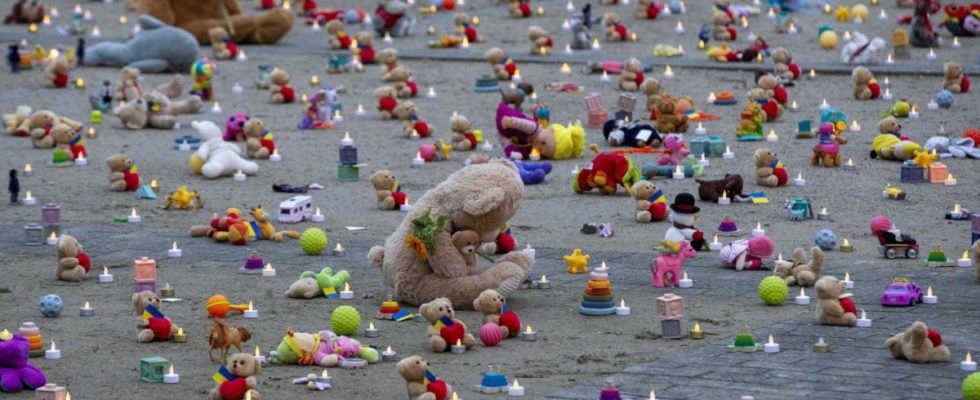A blonde girl can be seen on a cinema screen in Berlin, Prenzlauer Berg. She is ten years old, but she seems older when she talks about where she has spent the past few months: She talks about her time in a Russian re-education camp. The girl comes from the Kherson region in southern Ukraine. Russian soldiers abducted her after they occupied her hometown. She says she was punished if she spoke Ukrainian or refused to sing the Russian national anthem.
It is a fate that many Ukrainian children suffer. According to official information, there are almost 20,000. According to experts, the actual number is probably much higher. Since contact with many children and families in the occupied areas has been lost, it is difficult to trace who was kidnapped. Russian authorities themselves speak of up to 600,000 children who they want to have “brought to safety.”
A few hours earlier, Darja Kasjanowa was sitting in a café in the Prenzlauer Berg district of Berlin. She shows photos of her four-year-old daughter, who has been living in the war for two years. “At the beginning we told her that it wasn’t bombs she heard, but thunder,” says Kasyanova. Even before the war, she worked in an SOS children’s village. Today she is the chairwoman of the Ukrainian Children’s Aid Network. In 2014 she was forced to flee the eastern Ukrainian province of Donetsk. The now 46-year-old moved with her family to Irpin, a suburb of Kiev that became notorious when Russian soldiers carried out massacres of civilians there in the first weeks of the war.
When Kasyanova talks about her work, it sounds routine. In the evening there will be a panel discussion in the cinema. Former boxing world champion Wladimir Klitschko is also there. The German guests there are visibly touched by the fates. Just imagine that they are your own children, says CDU Bundestag member Michael Brand.
The International Criminal Court (ICC) has issued an arrest warrant against Vladimir Putin and Russian Children’s Rights Commissioner Marija Lvowa-Belova. The deliberate abduction and re-education of children are considered signs of genocide.
Kasyanova reports on desperate relatives who don’t know where their children or grandchildren are. Russian soldiers told them about holiday camps in Crimea where they could accommodate their children for free over the summer – far away from the war. However, the children usually never return from the camps to Ukraine, but are instead taken to Russia. Parents did not always send their children there voluntarily. Foster and home children are particularly at risk of being kidnapped, says Kasyanova.
Reliant on help from Russian authorities
Some of the children contact Kasyanova when they get a cell phone. She then tries to find out where the children were taken. She relies on Russian authorities to bring her back home. “The relatives must contact the Office of the Commissioner for Children’s Rights and prove that they have legal custody,” says Kasyanova. In the rarest of cases this works without any problems. And in the few cases where the Russians accept such a request, it’s still a long way home. Since there is no safe route through the front, the children have to travel to Ukraine via Belarus and Poland. According to official figures, 388 children have returned so far. Kasyanova and SOS Children’s Villages helped with repatriation in 84 cases.
“If you want to wipe out a nation, you have to wipe out the history of the nation”: Former boxing world champion Wladimir Klitschko (right) together with the Ukrainian ambassador Oleksiy Makejew in Berlin.
(Photo: Jörg Carstensen/dpa)
World boxing champion Wladimir Klitschko and an employee recorded the stories of the returned children in a book. “If you want to wipe out a nation, you have to wipe out the nation’s history,” he said, summing up the Russians’ strategy. The aim is for Ukrainian children to end up fighting on the front against their own people. Klitschko calls what is happening in the camps “brainwashing.” If you ask Darya Kasyanova why Russia is doing all this, she says: “Children are a trophy because they are the most valuable thing a society has.”

